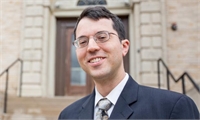Abstract: The [[7,1,3]] code has long been regarded as the gold standard for concatenated quantum error correction codes. In this talk we will look to optimize the implementation accuracy of several aspects of the code including how often it should be applied during a sequence of gates, what syndrome measurement schemes should be used, and the implementation of gates. This is then balanced by a cost-benefit analysis of resource consumption versus accuracy determined from a series of simulations for multiple gates applied to a logical qubit encoded in the [[7,1,3]] code.
References:
Y.S. Weinstein, “Quantum Error Correction During 50 Gates” Physical Review A 89, 020301(R) (2014).
Y.S. Weinstein, “Quantum Error Implementation After Multiple Gates,” Physical Review A 88, 012325 (2013).
Y.S. Weinstein, “Non-Fault-Tolerant T Gates for the [7,1,3] Quantum Error-Correction Code,” Physical Review A 87, 032320 (2013).
Y.S. Weinstein, "The Fidelity of an Encoded [7,1,3] Logical Zero," Physical Review A 84, 012323 (2011).
Biography: Dr. Yaakov S. Weinstein is a Lead Scientist in the MITRE QIS Group. He received his Ph.D. in Nuclear Sciences and Engineering in 2003 at the Massachusetts Institute of Technology under Professors David Cory and Seth Lloyd for work on QIS implementations using liquid-state nuclear magnetic resonance. After completing his Ph.D., Dr. Weinstein was awarded a National Research Council Research Associateship at the Naval Research Laboratory under Dr. Stephen Hellberg. During that time he retired his experimental uniform and conducted theoretical research on quantum dot implementations of quantum computation including the identification of decoherence-free-subspaces. Dr. Weinstein joined MITRE in May of 2005. His current research interests include aspects of quantum fault tolerance, the evolution of entanglement in decohering environments, and working with quantum randomness.

